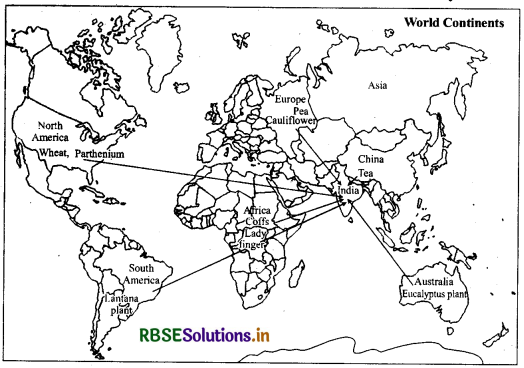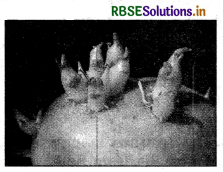RBSE Solutions for Class 5 EVS Chapter 6 Seed Becomes Plant
Rajasthan Board RBSE Solutions for Class 5 EVS Chapter 6 Seed Becomes Plant Textbook Exercise Questions and Answers.
The questions presented in the RBSE Solutions for Class 5 EVS are solved in a detailed manner. Get the accurate RBSE Solutions for Class 5 all subjects will help students to have a deeper understanding of the concepts.
RBSE Class 5 EVS Solutions Chapter 6 Seed Becomes Plant
RBSE Class 5 EVS Seed Becomes Plant Textbook Questions and Answers
Think and Answer
RBSE Class 5 EVS Chapter 6 Question Answer Question 1.
The names of some food items are given below in the table. Write the name of the part of the plant, which we use as food-
|
Name of food item |
Name of part of the plant used as food |
|
1. Rice |
|
|
2. Apple |
|
|
3. Carrot |
|
|
4. Pearls millet |
|
|
5. Radish |
|
Answer :
|
Name af food item |
Name of part of the plant |
|
1. Rice |
Seed |
|
2. Apple |
Fruit |
|
3. Carrot |
Root |
|
4. Pearls millet |
Seed |
|
5. Radish |
Root |

Observe and Note Down the Results
Seed Becomes A Plant Class 5 Question 1.
On the day of ‘Navratra Sthapna’, you must have seen white millet (known as jawara in hindi), grown in nearby temples and houses also. Take a transfer arent container, put different types of seeds in it and cover the seeds with soil. Now, note the changes going on in the container and record your observations.
|
Changes in the grains of |
First Day |
Second Day |
Third Day |
Fourth Day |
|
Chickpea |
|
|
|
|
|
Gr'oen gram |
|
|
|
|
|
Me’bean |
|
|
|
|
|
Rice |
|
|
|
|
Answer :
|
Changes in the grains of |
First Day |
Second Day |
Third Day |
Fourth Day |
|
Chickpea |
a little change |
a little bigger |
seed coat cracked |
offshoot seen |
|
Gr'oen gram |
a little bigger |
seed coat cracked |
offshoot seen |
radicals and plumule seen |
|
Me’bean |
a little bigger |
seed coat of some seeds cracked |
offshoot seen |
radicals and plumule both seen |
|
Rice |
a little change |
a little bigge |
offshoot seen |
offshoots seen |
Think and Answer
Seed Becomes A Plant Question Answer Question 1.
In which bowl, there is more germination? Why?
Answer:
There is more germination in bowl-2 because due to covering it with wet cloth, it gets favourable conditions.
RBSE Class 5th EVS Chapter 6 Question Answer Question 2.
In which bowl the germination of grains started from the day one.
Answer:
In bowl 2.
Class 5th EVS Chapter 6 Question Answer Question 3.
Why were the grains tied in a wet cloth for germination?
Answer:
Due to wet cloth, the grains get favor-able conditions for germination.
Class 5 EVS Chapter 6 Question Answer Question 4.
In which bowl, there is no germi-nation?
Answer:
In bowl-3, there is no germination because it did not get the needed moisture.
Class 5 Chapter 6 EVS Question 5.
Why there is no germination of the grains of the cereals, kept in our home?
Answer:
The grains of the cereals, kept in our home, don’t get enough moisture so there is no germination in them. Points for
Discussion
Seed Becomes A Plant Question 1.
Observe different plants in your surroundings and discuss which plants grow without a seed. From which part of the plant do they grow?
Answer:
Potato, money-plant, mint-plant, rose, jasmine, patharchatta, etc., are such plants which grow without seeds. Potato itself will become potato plant. Leaf of patharchatta will become a plant. Mint-plant root will grow as a mint-plant. Rose and jasmine stems will become plants.
Class 5 EVS Chapter 6 Question 2.
From which part of the plant do they grow?
|
Name of plant |
Part of plant |
|
Potato |
Stem |
|
Money plant |
Root |
|
Mint plant |
Root |
|
Rose |
Root |
|
Jasmine |
Stem |
|
Patharchatta |
Root |

Explore and Answer the Following
Seed Becomes Plant Question 1.
How is grafting done?
Answer:
For grafting, two plants are taken. The stems of both the plants are cut in the shape of a dip pen (nib pen). Then root-stock (base) and scion (top) are joined properly with the help of coding or compost fertilizer, and the j oint is tied with a thread. In grafting, rootstock and scion are taken from different plants.
EVS Class 5 Chapter 6 Question 2.
Write the name of a plant which is grown by its leaf.
Answer:
Patharchatta.
Think and Answer the Following
RBSE Class 5 EVS Chapter 6 Question 1.
Where have you seen plants growing at places other than the ground?
Answer:
In pots, on walls, on terrace, etc.
Things to Do
Class 5 E.V.S Chapter 6 Question Answer Question 1
Paste a map of the world in your notebook and mark the continents in it. Also, write the names of the food items and the plants with the continent from where they came to our country
Answer:

Explore
EVS Class 5 Chapter 6 Question Answer Question 1.
Out of the above, which foreign plants have you seen in your surroundings?
Answer:
Eucalyptus, Cauliflower, Parthenium (Gajarghas), Lady finger, Peas, Lantana plant etc.
Class 5 EVS Chapter 6 Extra Questions And Answers Question 2.
Read more stories from your school library about the travel of plants and seeds from one place to another.
Answer:
Do yourself with help your subject teacher.
Learnt, Understood and Now Tell
Question 1.
Explain about the necessary conditions required for the germination of seeds.
Answer:
For the germination of seeds, suitable moisture, temperature and air are needed.
Question 2.
Name a plant which grows without seed, and draw a diagram of it.
Answer:
Potato.

Question 3.
What is Dispersal?
Answer:
Seeds scatter in different places with high speed wind, they flow with water or they may stick on the beak of the birds and body of the animals. This phenomenon of scattering of seeds is known as Dispersal.
Question 4.
How do human beings help in the dispersal of seeds? Write it.
Answer:
People migrate and settle down at other places and they take seeds, plants, animals along with them from one place to another, which helps in dispersal of seeds.
Question 5.
Write the names of five plants which came to India from foreign countries.
Answer:
|
Plant |
Name of country |
|
1. Tea |
China |
|
2. Coffee |
Africa |
|
3. Lady finger |
Africa |
|
4. Cauliflower |
Europe |
|
5. Peas |
Europe |
RBSE Class 5 EVS Seed Becomes Plant Important Questions and Answers
Objective Type Questions
Question 1.
Choose the right option and write down in your notebook.
(i) Which part of the plant is rice?
(a) root
(b) stem
(c) fruit
(d) leaf
Answer:
(a) root
(ii) Which part of the plant is radish?
(a) fruit
(b) leaf
(c) flower
(d) root
Answer:
(d) root
(iii) Which part of the plant is an apple?
(a) fruit
(b) stem
(c) root
(d) leaf
Answer:
(a) fruit
Question 2.
(a) Different part of plants are used as ..............
(b) When seeds are covered with moist (wet) soil or soaked and tied, .............. come out of them.
(c) When a .............. of Patharchatta (Bryo- phyllum) is put under soil, then a new plant will grow from it.
(d) At Meena’s house .............. is grown in a water bottle.
Answer:
(b) food
(a) root
(c) leaf
(d) money plant
Question 3.
Match Column A and Column B :
|
Column A |
Column B |
|
Mint |
from leaf |
|
Rose |
from root |
|
Patterchatta |
from stem |
|
Tea |
Europe |
|
Coffee |
China |
|
Peas |
Africa |
Answer:
|
Column A |
Column B |
|
Mint |
from root |
|
Rose |
from stem |
|
Patherchatta |
from leaf |
|
Tea |
China |
|
Coffee |
Africa |
|
Peas |
Europe |
Question 4.
State True/False :
(i) Some plants grow in rainy season on then- own (naturally).
(ii) Birds perform dispersal of seeds.
(iii) Lantana plant is called Nilgiri also.
(iv) Some seeds of parthenium (Gajarghas) came along with wheat from the United States of America.
(v) Eucalyptus plant was brought from Australia.
Answer:
(i) True
(ii) True
(iii) False
(iv) True
(v) True.
Very Short Answer Type Questions
Question 1.
What did Monu find under the Neem tree and in the pot of basil?
Answer:
New and small plants.
Question 2.
What is a small plant called when it is grown up?
Answer:
Tree.
Question 3.
What is grown in temples and houses on the day of ‘Navratra Sthapna’?
Answer:
White millet (Jawara in Hindi).

Question 4.
Name any two plants whose root is used as food.
Answer:
- Carrot
- Radish.
Question 5.
Name any two plants whose fruits are used as food.
Answer:
- Apple
- Guava.
Question 6.
Name any two plants which grow from their stems.
Answer:
- Money plant
- Rose.
Question 7.
From which part of the plant mint is grown?
Answer:
From root.
Question 8.
From which part of the plant Bryo- phyllum (Patharchatta) is grown?
Answer:
From leaf.
Question 9.
Who brought Lantana plant from South America in India?
Answer:
The Britishers living in India, brought it.
Question 10.
Where was Laiitana plant planted first of all in India?
Answer:
It was planted in a garden in Kolkata City (Calcutta).
Short/Long Answer Type Questions
Question 1.
What is germination?
Answer:
The process of growing plant from a seed is called germination.
Question 2.
Why is Eucalyptus called Nilgiri?
Answer:
A British officer brought Eucalyptus from Australia and planted it in the Nilgiri hills in Tamil Nadu, so it is also called Nilgiri.\

Question 3.
From where did Parthenium (Gajarghas) come to India?
Answer:
In 1950, when India imported wheat from the United States of America, some seeds of Gajarghas came along with it.
Question 4.
How did Lantana plant come to India?
Answer:
The Britishers living in India, brought a plant of Lantana from South America and planted it in a garden in Kolkata (Calcutta) city.

- RBSE Solutions for Class 5 EVS Chapter 13 Let's Play with Water
- RBSE Solutions for Class 5 EVS Chapter 11 Life in Water
- RBSE Solutions for Class 5 EVS Chapter 12 Contaminated Water Spreads Diseases
- RBSE Solutions for Class 5 EVS Chapter 10 Flow of Water
- RBSE Solutions for Class 5 EVS Chapter 3 We are Special
- RBSE Solutions for Class 5 EVS Chapter 10 जल ऊपर से नीचे की ओर
- RBSE Solutions for Class 5 EVS Chapter 6 बीज बना पौधा
- RBSE Solutions for Class 5 EVS Chapter 7 Magnificence of Trees
- RBSE Solutions for Class 5 EVS Chapter 11 जल में जीवन
- RBSE Solutions for Class 5 EVS Chapter 8 The Unique World of Insects and Animals
- RBSE Solutions for Class 5 EVS Chapter 1 Understanding Our Relations